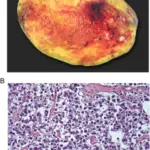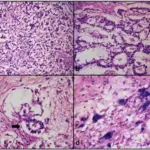Ovarian yolk sac tumor is a rare, malignant tumor of cells that line the yolk sac of the embryo. They are mostly benign.
What is the Pathology of Ovarian Yolk Sac Tumor?
The pathology of ovarian yolk sac tumor is:
-Etiology: The cause of ovarian yolk sac tumor is unknown.
-Genes involved: RUNX3 gene mutation.
-Pathogenesis: The sequence of events that lead to ovarian yolk sac tumor is malignant cell proliferation.
-Morphology: The morphology associated with ovarian yolk sac tumor shows large, complex pelvic mass that extends into the abdomen and contains both solid and cystic components.
-Histology: The histology associated with ovarian yolk sac tumor shows Schiller Duval bodies.
How does Ovarian Yolk Sac Tumor Present?
Patients with ovarian yolk sac tumor typically females at 25-30 years age. The symptoms, features, and clinical findings associated with ovarian yolk sac tumor include: distended abdomen with a palpable adnexal mass, abdominal pain followed by abdominal enlargement. fever, and distended intra-abdominal fluid.
How is Ovarian Yolk Sac Tumor Diagnosed?
Ovarian yolk sac tumor is diagnosed by immunohistochemical staining, urine pregnancy test, blood tests for CA-125, lactate dehydrogenase LDH, and α-fetoprotein AFP levels, CT scan.
How is Ovarian Yolk Sac Tumor Treated?
Ovarian yolk sac tumor is treated by: radical surgery or conservative surgery, chemotherapy
What is the Prognosis of Ovarian Yolk Sac Tumor?
The prognosis of ovarian yolk sac tumor is excellent if diagnosed at early stages. The 5-year survival rate of 95% or more is present after surgery and chemotherapy.



